|
|
|
|
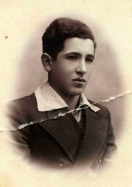
|
|
1938 Passport Photo Mosze Szymon Rozenbaum
Went to Australia, 1939 |
|
| |
|
My father was born in Radzilow, Poland in 1921 and was the youngest son of Zundel
(Chanoch) Rozenbaum and Rochla Gitla (Alte)
(nee Sawicki). He had 3 sisters, Brajna (Briony), Chajche (Irene) and Shaine, and a brother Yankel, and was the sole survivor of his
immediate family. His father Zundel died 4 weeks before he departed for Australia,
and the
remaining family all perished during the Holocaust. Zundel was the second oldest of 11
children and Alte was one of 3 children (she had a brother Yankel and a
sister Frejda, who left Poland with
her 3 children in 1934 and settled in the US). In Zundel's
family Meir was the oldest, followed by Zundel, Sochie, Fejga, Yankel, Esther,
Moshe, Rochel, Nathan, Chaim and Chajche Rywka.
The family was very religious; Zundel
was a Yeshiva student and attended a Rabbinical College until he married. He
then worked as a scribe, writing letters for people (many of whom were
illiterate) and he had a wonderful style of writing and a way with words. He also
taught a few young and middle-aged students and spent the rest of his time in
religious studies and at the synagogue. He was in very poor health and my father
would always pick him up from synagogue, as he had a weak heart and found it
difficult to walk unassisted. As a result, Alte became the breadwinner, with the help
of her children and family from abroad. Before the Jewish holidays, money came
from relatives in the UK, US and Australia, and Sochie in London also sent parcels
of old clothes, which were then recycled and worn by the family. My grandfather's
most urgent wish was to marry his daughters off, but with no means of getting a
dowry together, this was impossible. The marriage between my grandparents was
an arranged match; Yitzchak Sawicki wanted a Rabbi's son as a son-in-law.
Yitzchak was a wealthy grain merchant and supported them financially. However, in
1919 after WWI, an Act was passed by the Polish Parliament annulling all monies
owed to merchants or landlords, and my maternal gr-grandfather became impoverished
over night. This is when Alte became the breadwinner and survived by selling all
the valuables she possessed, including a pair of gold candlesticks. My father
described her as a beautiful woman with an olive complexion and long black curly
hair.
|
|
|
|
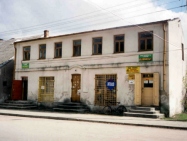
|
|
Police Station, where Mosze Szymon and family lived in
rented premises upstairs |
|
| |
|
|
|
|
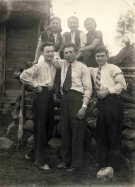 |
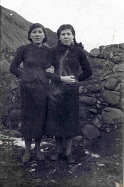 |
[Front row, middle]:
Yankel Rozenbaum
Yankel killed in
Radzilow, 1941 |
[L-R]: Brajna and
Shaine Rozenbaum
Both killed in
Radzilow, 1941 |
|
|
| |
|
Dad's oldest sister Brajna was 8 years
older than Dad and was a tall, thin, good-looking girl. She helped with the
housework and kept the house spotlessly clean. At one time she was introduced to
an elderly widower from a nearby town. He came several times but nothing
eventuated from the meeting. His second oldest sister was called Irene and she
worked for some relatives on the Sawicki side as a ladies and gents shirt-maker.
She saved enough money to buy a Singer sewing machine and started to work on her
own at home. She had many customers and established a good little business. She
traveled to Warsaw with Dad and bought and paid for all his clothes. His
youngest sister Shaine was 2 years older than Dad and finished primary school.
She was a very good student and always helped Dad with his homework. She helped
her mother with the housework and also helped her sister making shirts. When Dad
left for Australia, she was the one to write on behalf of the family; in her
last letter she told Dad how much the family missed him. Dad wrote back telling
his family how heart broken he was without them. This was the last
correspondence between them. His brother Yankel attended a Yeshiva and was very
well-educated but had to leave to support the family. He became the main
provider selling grain and animal skins. There was a real bond between Dad and
his brother and of all his family, Dad thought that Yankel's dynamic personality
and determination might help him to survive the Poles and the Germans.
As the youngest child my father spent a
great deal of time with his father and absolutely adored him. My grandfather
had many volumes of leather bound Talmudic and religious texts and Dad always
regretted not taking some with him. The only thing my father brought with him
from his parents was a pair of tefilin.
He did not even have a photo of his
mother and father. Zundel would often sit with Dad and talk with him about
religion and the world in general. Dad slept with his father so he could watch
over him and would get up several times a night to see if he was still
breathing. Zundel was a quiet, reserved man, and highly respected by the Jews in
Radzilow. He was a devoted husband and loving father and each Chanukah would
somehow find the money for Chanukah gelt for all his children. The family was
very poor and would often not have enough food to eat. On many occasions Dad
went to school without any breakfast and found it very hard to concentrate on
his studies. He often told us about the times he was so hungry that he couldn't
sleep and would go outside and get a handful of snow to appease his hunger. He
did not have a decent pair of shoes or clothing. They lived upstairs in an old
building in the main street of Radzilow (the police station was downstairs), the
house consisting of 2 rooms and a kitchen, and was always cold and damp, as they
could not afford to buy wood or coal.
|
|
|
|
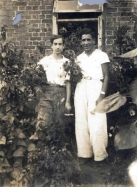 |
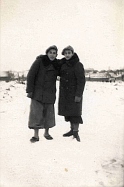 |
|
Best friends throughout their days in Radzilow:
Arczy (Archie) Fajkowski and Mosze Szymon
Arczy killed in Radzilow, 1941
Mosze went to Australia, 1939 |
|
| |
|
My father was a keen student and
completed 7 grades of elementary school. He always came out on top in math, history,
geography and essay writing. He writes about his best friend Arczy (Archie) Fajkowski
and how they studied together by candlelight, and how Archie would often bring
him a slice of bread and other food to share with him. I still have one of
the notebooks they shared, which contains their school
notes. Before he left Poland for Australia, Archie gave my father a gift of a
wooden box engraved with his initials on it. I still have this box. It was not
possible for my father to further his education after
7th grade due to lack
of money to pay the fees and the difficulty for Jews to continue in higher
education. He then joined a free Jewish discussion group, which was held in the
evenings. At this time he was 15 years old and determined to further his general
and Jewish knowledge.
|
|
|
|
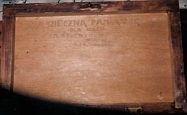 |
|
Wooden Box
Inscription reads: Na Wieczna
Pamiatke, Dla Kolegi,
M. Rozenbauma, Ofiaruje,
A. Fajkowski.
Translation: In token of friendship,
[Literally "For eternal memory"
a common Polish expression when inscribing something like a picture
or a nice present], To my friend
M. Rozenbaum, From A. Fajkowski. |
|
|
| |
|
Radzilow was situated on the East
Prussian Polish Border and with the rise of Hitler in 1933, anti-Semitism became
rife in the area. Jews
were impoverished and forced to beg for food. At times there was no food in my
father's house and my grandmother was forced to sell anything of value to
buy food for her husband and her children. All Jewish shops were picketed and,
if by chance a Pole bought from a Jewish premises, the pickets would pour
kerosene over the goods and burn them. The police did not intervene and looked
the other way. The Polish Government then passed a special law regarding Jews:
the Poles could boycott their businesses but they could not hurt or hit a Jew.
In this way they aimed to starve the Jewish population, most of who were
involved in commerce and trade, and make it impossible for them to exist.
In Lomza there was a Catholic priest
by the name of Trzeciak who was an outspoken anti-Semite, whose main aim was the
destruction of all Jews. He was also a Member of Parliament and the editor of
"Gazeta Polska," a newspaper that consisted entirely of anti-Jewish propaganda and hatred.
It was almost impossible for Jewish students to
obtain higher education. Jewish students at university were not allowed to sit
on the same benches as Poles, and had to stand through lectures and were often beaten up
and badly hurt. There was no one to protect the Jews, and with the Poles demanding
their annihilation, only one voice existed: "Jews to Palestine."
From 1933 onwards the pogroms began,
the worst of which occurred in the smaller towns. In the winter of 1933 a pogrom
took place in Radzilow on market day. In Radzilow, the market used to be held
every Thursday. Jewish small merchants from the district townships used to come
with their merchandise, such as sheepskin coats, shoes, boots, barrels with
smoked herrings, and many other items. The Polish farmers used to bring
different grains, such as wheat, corn, barley and oats. The small Jewish
merchants, mainly from Szczuczyn, used to buy up all the grain, most of which
was sold onto Nazi Germany [Szczuczyn was even closer than Radzilow to the
German border]. The price of grain used to rise daily because Germany was
preparing for war. The peasants
from nearby villages invaded Radzilow, armed with iron bars and lumps of wood, and
attacked the Jews. On the same day the priest
Trzeciak from Lomza came to
Radzilow and delivered a chilling anti-Semitic speech advocating the killing of
all Jews. As soon as he finished speaking, the peasants began robbing all the
Jewish stalls and shops. The Poles killed a Jewish woman [who was in town for
market day, from Jedwabne] and robbed every Jewish home. The police could not control the riots and called for
reinforcements from nearby townships. In order to control the crowd the police
sergeant ordered his police to shoot in the air and 4 Poles were killed; only then
did the crowd disperse. Radzilow was devastated and ruined. My father was at
school and ran home along the fields fearing for his family and was absolutely
petrified by the events. On the Friday, the funeral for the Poles took place,
with the local priest delivering the eulogy. He described the dead as great
Poles and said "that if Jewish blood was not scattered to the four corners of the world,
then Christianity was not meant to survive." The Jews of Radzilow hid in their
attics, too afraid to venture out. This lasted for several weeks. Gradually,
people left their homes to buy food, which was supplemented by basic supplies
from relief agencies. The general situation was frightening and bleak; there was
no future and nowhere to go. Anyone with means left Poland - every Saturday
several Jewish families left for overseas, with quite a few going to Palestine.
It was a constant exodus, with fewer and fewer families remaining.
|
|
|
|
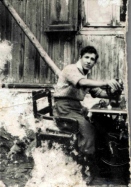 |
|
Late 1930's
Mosze Szymon
working on a
sewing machine
Note: The actual size of the original photo is less than an inch on each side |
|
|
| |
|
My father was really troubled by the
situation and got all the addresses from his father of relatives overseas and
began writing to them, begging them to provide him with the necessary documents
to leave Poland. My father was 13 years old at the time. The anti-Semitism
increased daily and my father and his friends were regularly beaten up by the
Polish boys. One summer while swimming in the river, my father was severely
beaten and had 10 deep welt marks on his back that were unbearably painful.
After this episode, he and his friends did not go swimming again. Even though my
father knew the Polish boys, nothing could be done, as there was one set of laws
for them and none for the Jews. At the same time a young cousin, David Sawicki,
aged 11, was locked in a stable and beaten so badly by the Poles that he passed
away 2 weeks later. It was the first time that my father saw parents burying a
son.
Pogroms continued in town after town
and new anti-Jewish laws were introduced daily. Hitler was preparing for war and
the first words of all his speeches began with "the filthy, dirty, bloody
Jews." It was terrifying to hear this all the time and my father decided to
smuggle himself across the German border at night and make his way to Lithuania.
However, the borders were so heavily guarded that he decided against it. He
received no replies to his pleas for help and felt that the odds to leave were
against him. In 1936 an Act was passed in the Polish Parliament by a Madame Pristerowa to ban the ritual kosher killing of meat. Jewish families were
allowed only 1/2 kilo of meat per week. As the situation deteriorated, Dad wrote
again to family in Australia and within 2 months (August 1936) came a reply from
Ben Rosenbaum (son of Nechemiah and Fejga) saying that he would organize the permit for Dad to come to
Australia. He also paid the fare to Australia of 50 Pounds, which Dad later repaid
after he began working.
|
|
|
|
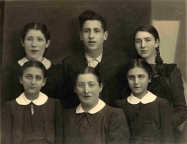
|
|
Warsaw, 1938
[Back, L-R]: Chajche (Irene), Mosze Szymon, cousin
[Front, L-R]: cousin,
Aunt Rochel, cousin
Mosze went to Australia, 1939
Chajche killed in Radzilow, 1941
Rochel, her husband Yudel, and
3 daughters all killed in Warsaw |
|
| |
|
My Father was overjoyed but had many
sleepless nights thinking about the family he would have to leave behind. He
waited for the post [mail] to come every day with his permit, and as the months went by,
he began to give up hope. Being the youngest in the family, Dad helped his mother
with the household chores and would walk 4 kilometers to a small village called
Dziewiecin to buy 25 kg of corn flour with which to bake bread. The money for
the flour came from overseas relatives and meant that at least the family had
bread for a few weeks. Dad also went to the well to get water everyday, as the
water was not connected to the houses. This was not so difficult in the summer but
was quite dangerous in the winter when everything was covered in ice and snow.
The toilet was outside and the sewerage also had to be taken to the rubbish tip
on a daily basis. Dad also sold grain for a short period to try and bring some
money home, but this only lasted from July to September. In the meantime, Dad
kept writing to Australia and they assured him that the permit was being
processed and that they would pay his fares. At this time, Dad learned that his
cousin Lazar Kajman and family were going to Australia and that they would
arrive there before him. Finally, in July 1938, the permit arrived and my father
and his family were overjoyed. The necessary documents had to be obtained from
Grajewo, and for the first time in his life, Dad went to Warsaw to get his
passport. He traveled by train and on his arrival at the station asked a droshke
driver [horse-drawn carriage] to take him to Franciszkanska 4, the
home of his aunt Rochel (his father's sister). He was in awe of the city. This was his first time away
from home and it was also his first meeting with his aunt and her husband Yudel and their 3 young daughters.
After lunch and in the following
days, his aunt took him to all the necessary offices to obtain his legal
documents. Franciszkanska Street was mainly a Jewish area,
full of Jewish traders selling all manner of goods, and he awoke to the sound
each morning of vendors selling bagels, pastries etc. Dad stayed with his family
for several days and makes mention that this was the first time he had ever seen
an indoor toilet, and that it took him sometime to figure out how to use it. With
all the formalities complete, his aunt and family took him to the station for the
journey back to Radzilow. His passport and visa were to arrive shortly after his
return and all that had to be done was to arrange the date when he was to leave. Everyone
told him how fortunate he was to be leaving Poland, but Dad was brokenhearted to
be leaving his mother, brother and sisters behind. His father died 4 weeks before Dad's
departure. On a Sunday at 4 p.m. on the 2nd day of Shevat in 1939, my grandfather
died in my father's arms. In those days the preparation for burials took place
at home, Dad went to get the men from the Chevra Kadisha, who came and lifted the
body from the bed, laid it on the floor and then covered the body with a
linen sheet. Candles were burning on either side of the body. The funeral took
place on Monday. The body was taken to the synagogue where Rabbi Zelik Gelgor,
the village elders, his brother Yankel, and his family and friends, all paid their
last respects and tributes. The body was then taken to the cemetery where my
grandfather was laid to his eternal rest. There were no coffins in those days and the
body was placed in the grave, and then a 1/2 a meter above the body, wooden boards were
placed along the grave. My father's brother Yankel put the first 3 shovels of
earth in the grave, then it was Dad's turn, and then his uncle Yankel's turn, and
then the grave was filled by relatives on his mother's side of the family. Dad
and his brother recited Kaddish and then returned home without their "jewel in
the crown." The family was devastated by the loss and Dad felt really guilty
about leaving his grieving family. He had not expected his father's death and
always thought he would be able to say goodbye to him.
|
|
|
|
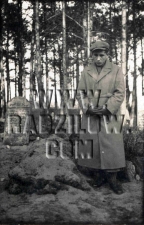 |
|
Late February 1939
Mosze Szymon, shortly before leaving Radzilow, paying his last
respects at the fresh grave of his father, Zundel Rozenbaum, who
had passed away only four weeks earlier, on
Jan 22, 1939
Note: This is the only
photo ever uncovered of
the Radzilow Cemetery,
which no longer exists. |
|
|
| |
|
After the Shiva period, Dad had to go to
Grajewo to finalize his emigration papers and to organize the departure date
after the Shloshim Period [shloshim is the Hebrew word meaning 30; in this case
it refers to the first 30 days of mourning]. The week before Dad left, he went to the cemetery with
his best friend Arczy Fajkowski to say his final farewells. Arczy took the photo
of Dad standing at the graveside. A night before the departure, all the family
and his friends came to say goodbye. The most heartbreaking thing of all was saying
goodbye to his mother, brother and sisters. The only consolation was the
possibility of being able to help his family when he arrived in Australia.
Unfortunately this never eventuated and Dad was never to see any of his
immediate family again. Dad's sister Irene went to Warsaw with him and
she and his aunt Rochel went shopping with him and bought a couple of shirts, a
scarf, a gabardine raincoat, 2 pairs of socks and a pair of shoes. His aunt Chajche Rywka, from the nearby town of Garwolin,
especially made the effort to come
and say goodbye. This was the first and last time Dad ever saw this aunt.
|
|
|
|
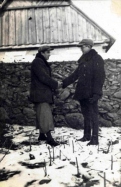
|
|
February 1939
Mosze Szymon saying farewell
to his friend Wasersztejn, who later went to Israel |
|
| |
|
Towards the end of February, Dad bid
farewell to his sister, aunts and family, and took the train from Warsaw to
the port city of Gdynia [in the Gulf of Gdansk]. He arrived early in the morning; the city was covered
in snow. This was his first sight of the Baltic Ocean. He boarded the small
Polish boat of 3000 tons named The Baltrower about 11a.m. on
a Friday, together with about 40 Jewish people. Several of the passengers ended
up in Australia, where they remained in touch. There was a Rabbi among the
passengers who was given special consent to board the boat on the Sabbath. As
the boat sailed towards Danzig, Dad saw swastika flags on all the buildings and
could feel imminent danger, but not to the extent of the Holocaust that took
place. The journey took 5 days, the sea was very stormy, Dad was very seasick
and was thrilled when they berthed in London.
He arrived in London at the beginning
of March 1939, where his aunt Sochie warmly greeted him. He was kissed and hugged
by his aunt, who wanted to know all about the family (Dad did not tell her about
his father's death) and then taken to 121 Christian Street, off Commercial Road,
East London, to meet the rest of the family. Their business of tailor trimmings
was situated at the front of the building and the family lived at the back. This
business still exists today. Dad spent 11 wonderful days in London meeting his
family and their friends. He helped his aunt make up a parcel of clothing to
send back to the family in Poland. His uncle took him to the synagogue to say Kaddish
for his father and bought a daily Jewish paper with a Yiddish edition so Dad was
able to keep abreast of what was happening in Europe. During his stay, the French
President paid a State visit to London to discuss the deteriorating situation.
Wherever Dad went, people were digging air raid shelters behind their houses
and in all the public parks, in preparation for what lay ahead.
After 11 wonderful days Dad left London. His cousin Nat Kissin gave
him 10 shillings, and this was the only money Dad had for the journey to
Australia. He sailed from England on the March 12, 1939, on the 15,000-ton S.S.
Ormonde, which was luxurious in comparison to The Baltrower. The journey took 6
weeks, during which time Passover was celebrated. Every Jewish passenger was
given a packet of matzoh and a bottle of wine. The first Seder was conducted by
an elderly man named Korczik from Lomza, helped by the chief steward Alec
Goldman, who turned out to be a good friend of Dad's cousin Ben Rosenbaum. The
first port of call in Australia was Fremantle, WA, on ANZAC Day, April 25, 1939.
My father saw his first military parade on Australian soil. This holiday
commemorates Australian and New Zealand soldiers who were killed defending their
countries. The Ormonde arrived in Melbourne on May 1, 1939, and my father was
met by Ben Rosenbaum and Lazar Kajman. Lazar had come to Australia with his wife
Zelda and 2 young sons, Norman and Morry; his father Velvel was Dad's
grandmother's brother on his father's side of the family.
During the boat trip my Father was
terribly homesick and worried about what he would do in Australia with no
friends, no language and no trade. Luckily, his cousin Ben spoke Yiddish and
accorded him a very warm welcome. Dad spent his first weeks in Melbourne at the
home of Ben and Bella Rosenbaum and their young son Maurice, at 4 Ellsmere Road,
Windsor. They had a very comfortable home with a front and back garden and this
was a real eye opener to Dad after the abject poverty of his home in Radzilow.
One evening they took him to the Capitol Theatre and this was the first talking
movie Dad ever saw. They also took him sight seeing around Melbourne and his
impressions were of a very green, clean and beautiful city. He was introduced to
the delights of Devonshire Tea (scones, strawberry jam, cream and a pot of
English tea) and kept thinking how his family at home would enjoy this treat and
the wonderful lifestyle of Australia.
After two weeks with his cousin, Dad
moved to North Carlton (the suburb where all Jewish immigrants lived when they
first arrived in Melbourne), to the home of the Landy's at 557 Nicholson Street,
and shared a room with their son Joe. Ben had to help Dad pay for the room and
board, as he had no money and no job. The only place Dad did frequent was the
Kadimah (a cultural center), which was a meeting place for Jewish immigrants. All
the immigrants were in the same boat and used to exchange stories about looking
for work and about life in general. My father was reserved and shy by nature, and kept
fretting and worrying for his family and friends. He also worried about the fact
that he had no money, no trade and could not speak English, and often thought he
had made the wrong decision in coming to Australia.
The next week his cousin Ben came to
help him look for a job in the clothing trade. He bought him a pair of scissors
for 25 Shillings and Dad's only thoughts were of how was he going to repay his
cousin Ben. He got a job for a week as an under-presser and earned 7 shillings and sixpence. This lasted a week and then
Dad was given the sack. After numerous attempts, he finally got a job but it did
not pay enough to make ends meet and Ben had to supplement Dad's income. He
lasted there for 3 months and then moved to a factory making very cheap staff
shirts, pajamas and trousers. The workforce consisted mainly of women who were
on piecework and worked a 48-hour week, but earned good money for their efforts.
Dad thought to himself that if they can do it so can he, and eventually became the
fastest machinist, making 65 pairs of trousers a day and earning 5 Pounds. With
the first 5 Pounds that he saved, Dad opened a bank account. This was the first
time in his life that he had money of his own.
The price he paid, however, was that he
had to work on Saturdays, and this meant he could not go to synagogue. However, he
went every evening for 11 months to say Kaddish for his father and also whenever he
could with Mr. Landy, but felt guilty about betraying his beliefs. Eventually
Dad was able to attend synagogue regularly, and in later years, was elected 3
times as president of East Melbourne Hebrew Congregation and attended weekly shiurs
[study sessions of religious text]. He also learned English 3 times a week at the Kadimah and managed to
pick up the language quite easily. My father managed to repay his cousin Ben for
the fare to Australia, the scissors and rent money and then saved 10 Pounds (250
zlotys) to send to his family in Radzilow. However, this did not transpire
since war broke out on September 1, 1939. Dad was at his cousin's house on a Sunday evening and
remembers on the way home a Special Edition of The Herald that came out declaring that
England was at war with Germany. Dad was devastated by the news and what would
happen to his family. He received 1 or 2 letters from his brother Yankel, who
told him that all the Polish officers threw away their uniforms after 3 or 4
days on the front line, only the non commissioned officers remained to the end.
Poland was utterly devastated - and after that there was complete silence. Every
evening a bulletin was posted in the Kadimah giving details of missing family
and friends, but Dad never got any news of what happened to his family.
On the Queen's Birthday Weekend, June
1939, Dad had been taken to Shepparton to meet the Rosenbaum family. Fejga and
Nechemiah (Ben's parents) were elderly and Nechemiah suffered from dementia. Dad
also met his uncle Rabbi Goldberg for the first time on Australian soil. His
uncle told him that he had received a letter from Zundel asking him to keep an
eye on Dad and make sure that he goes in the right direction. Dad would also
sometimes visit his father's brother Morry Rose on Sundays, but never felt very
comfortable there as they were not on talking terms with the Rosenbaum's. They
had 2 children Norman and Irene. Norman became a doctor and married out (there
was some talk of him being involved in missionary work), and the last time Dad saw
them was at their father's funeral. He would also visit Ben and Bella on Sundays
and stay to tea. Dad developed a very special bond and friendship with their son
Maurice and that lasted till my father's death.
My father met my mother Tola Liwerant
in the Easter holidays of 1939 and they immediately liked each other. My mother
had arrived from Siedlic on the March 20, 1939,
traveling with an aunt and
family. My mother was also the sole survivor of her family and left behind her
parents and 4 brothers. My parents were engaged in June 1942 and married on
November 26, 1942. They had 2 children: Helen born in 1945 and Arnold born in
1946. Soon after meeting my mother, Dad was called up for military service and
spent 4 years with The 6th Employment Company, which was made up of friendly
aliens (about 150 were Jewish). In Tocumwal, he helped load and unload goods from
trains that had to change gauges and he also stacked ammunition boxes. He worked
very hard in the army and was offered 2 stripes, but declined. In 1944 he was
discharged from the army to work on the orchard at Shepparton and stayed there
for several months before coming back to his wife and baby daughter Helen.
My father then continued to work in the
clothing industry and established his own business, Oban Clothing Company, with 2
partners. This partnership was dissolved in 1958 and my father went on to run a
very successful clothing company. He was extremely well-liked in business and
had an excellent reputation. He was very involved in the Jewish community
and the synagogue and took a keen interest in world politics, and Israel in
particular. In later years he attended classes at the university, went to a weekly shiur, and read widely. He was lucky enough to travel to the UK and the US to
meet his cousins, and kept in close touch with them throughout his life.
My mother died in 1974, aged 55, and my
father later remarried in the mid-1980's. My father became ill in 1999 and died
on December 17, 2001, leaving behind his second wife Miriam, children Helen
and Arnold, and grandchildren Michael and Candy, Elise and Alon.
I was indeed privileged and blessed to
have the most wonderful father and friend any daughter could ever wish for and
will always remember him with deep love and respect. My father valued education
very highly and worked hard to give his children and grandchildren the
educational opportunities that were denied to him. This, together with his love
for his family, was the greatest gift he bestowed on us. I will always be
grateful to my father for writing his story, as it has given me an insight into
his life and that of the family I never knew.
|